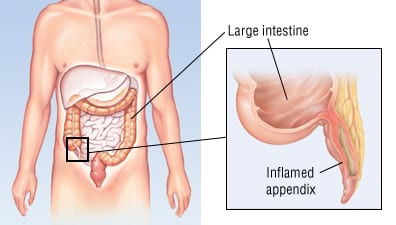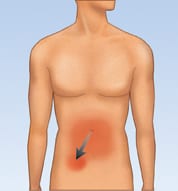Patient Basics: Appendicitis
Originally published by Harvard Health.
What Is It?
Appendicitis is an inflammation of the appendix, a small, fingerlike tube that hangs from the lower right side of the large intestine. The purpose of the appendix is not known. It usually becomes inflamed because of an infection or an obstruction in the digestive tract. If untreated, an infected appendix can burst and spread the infection throughout the abdominal cavity and into the bloodstream.
Appendicitis affects 1 in every 500 people in the United States each year. The risk of appendicitis increases with age, peaking between ages 15 and 30. Appendicitis is the main reason for abdominal surgery in children, with four of every 1,000 children needing the appendix removed before age 14.
Symptoms
Symptoms of appendicitis include:
- Abdominal pain, usually starting just above the belly button and then moving to the right lower side of the abdomen
- Nausea
- Vomiting
- Abdominal swelling
- Pain when the right side of the abdomen is touched
- Low-grade fever
- Inability to pass gas
- Change in normal bowel pattern
If you have symptoms of appendicitis, do not take enemas or laxatives to relieve constipation: These medicines increase the chance that the appendix will burst. Also, avoid taking pain-relief medicines before seeing your doctor, because these medications can mask appendicitis symptoms and make diagnosis difficult.
Diagnosis
Your doctor will review your medical history, especially any digestive illnesses. Your doctor will ask about your current digestive symptoms, including details about your most recent bowel movements: the timing, frequency, character (watery or hard), and whether the stool was streaked with blood or mucus.
Your doctor will examine you and check for pain in your lower right abdomen. In children, the doctor will look to see whether the child holds his or her hands over the navel when asked where it hurts. In an infant, flexed hips (knees held toward the chest) and a tender abdomen can be important clues to the diagnosis.
After the physical examination, your doctor will order blood tests to check for signs of infection and a urinalysis to rule out a urinary tract problem. Your doctor may order an ultrasound or computed tomography (CT) scan to help confirm the diagnosis. In very young children, a chest X-ray may be needed to rule out pneumonia.
Expected Duration
Most people will seek medical attention within 12 to 48 hours because of the abdominal pain. In some cases, a low level of inflammation exists for several weeks before a diagnosis is made.
Prevention
There is no way to prevent appendicitis.
Treatment
The standard treatment is to remove the appendix. The surgery, called an appendectomy, should be done as soon as possible to reduce the risk of the appendix rupturing. If appendicitis is strongly suspected, a surgeon will often advise removing the appendix even if an ultrasound or CT scan cannot confirm the diagnosis. The surgeon’s recommendation to operate reflects the danger of a ruptured appendix: It can be life threatening, while an appendectomy is a relatively low-risk operation.
Surgeons will frequently opt for laparoscopic surgery to remove the appendix because the average length of stay in the hospital is shorter and recovery is quicker compared to the standard surgical approach.
People usually are given antibiotics intravenously (into a vein) during surgery. The antibiotic is continued until the day after surgery. If the appendix ruptured, the person will need to take antibiotics for a week or more.
When To Call a Professional
To avoid the risk of a ruptured appendix, contact your doctor immediately if you or a family member has symptoms of appendicitis. Appendicitis is an emergency, and it requires immediate attention.
Prognosis
People who need surgery often stay in the hospital two to three days (if the appendix did not rupture). People who have an appendectomy normally recover completely.
In cases of a ruptured appendix, the hospital stay is usually longer. Although it is rare, a person can die of appendicitis if a ruptured appendix spreads infection throughout the abdomen and into the blood.
Additional Info
National Institute of Diabetes and Digestive and Kidney Disorders
Office of Communications and Public Liaison
Building 31, Room 9A06
Center Drive, MSC 2560
Bethesda, MD 20892-2560
Phone: 301-496-3583
http://www.niddk.nih.gov/





